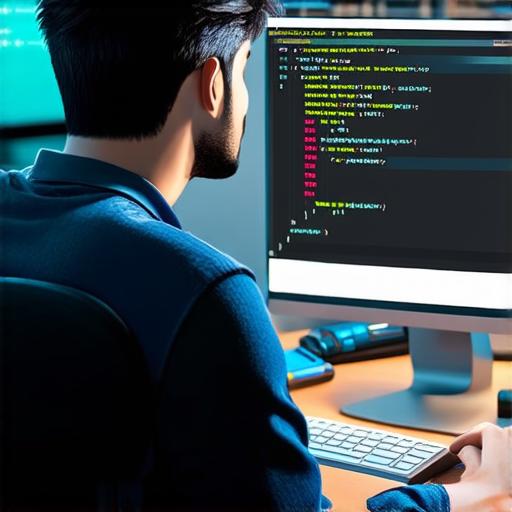If you’re looking to start programming and become a software developer, congratulations! You’ve taken the first step towards an exciting and rewarding career. However, knowing where to begin can be daunting, especially if you have no prior experience or knowledge of coding. In this article, we will provide you with a comprehensive guide on how to begin programming and become a software developer.
Why Should You Learn Programming?
Before diving into the nitty-gritty of programming, let’s explore why you should learn programming in the first place. There are numerous reasons why learning programming is valuable, including:
- High Demand for Programmers: With the growing reliance on technology and automation in today’s world, there is a high demand for programmers across various industries, such as healthcare, finance, and education.
- Good Salary and Job Security: According to the U.S. Bureau of Labor Statistics, computer and information technology occupations are projected to grow 11% from 2019 to 2029, which is faster than the average for all occupations. Additionally, programmers often enjoy good salaries and job security.
- Creativity and Problem-Solving: Programming requires creativity and problem-solving skills. It allows you to turn your ideas into reality and find innovative solutions to complex problems.
- Versatility: With programming skills, you can work on various projects, from developing mobile applications to creating websites and software systems.
Choosing a Programming Language
When it comes to programming, there are numerous languages to choose from. Some of the most popular programming languages include Python, Java, JavaScript, C++, and Ruby. Each language has its own strengths and weaknesses, so it’s essential to choose one that suits your learning style and career goals.
If you’re a beginner, we recommend starting with Python or JavaScript. Both languages are easy to learn and have a large community of resources and support available online. Additionally, they are versatile and can be used for various projects, such as web development, data analysis, and machine learning.
Once you’ve chosen a programming language, it’s time to start learning the basics.
Now that you’ve chosen a programming language, it’s time to start learning the basics. Here are some key concepts and skills you should master when learning to program:
- Variables and Data Types: Variables represent values in a program and come in various data types such as integers, floating-point numbers, strings, and booleans.
- Control Structures: Control structures are used to direct the flow of your program. They include if/else statements, loops, and conditional statements.
- Functions: Functions are reusable blocks of code that perform a specific task. They can be defined within a program and called as needed.
- Input and Output: Input allows users to enter data into the program, while output displays the results.
- Debugging: Debugging is the process of identifying and fixing errors in your code. It’s an essential skill for any programmer.
There are numerous resources available online to help you learn these concepts and skills. Websites such as Codecademy, Udemy, and Coursera offer courses and tutorials on programming, while blogs and forums provide additional support and guidance.
Building Your First Program
Once you’ve learned the basics of programming, it’s time to start building your first program. Here are some tips to help you get started:
- Start Small: Begin with a simple program that performs a specific task, such as calculating the area of a circle or displaying a message on the screen.
- Break It Down: Break down the problem into smaller, more manageable tasks. This will help you stay focused and avoid feeling overwhelmed.
- Test Your Code: Test your code frequently to ensure it’s working correctly. Debugging is an essential part of the programming process.
- Seek Feedback: Share your code with others and seek feedback. Constructive criticism can help you improve your programming skills and learn new techniques.

Building a Project
Once you’ve built your first program, it’s time to start building a project. A project is a more complex program that solves a real-world problem or fulfills a specific goal. Here are some tips to help you build a project:
- Choose a Project: Choose a project that interests you and aligns with your career goals.
- Plan Your Project: Create a project plan, including timelines, milestones, and resources needed.
- Build Your Project: Start building your project by breaking it down into smaller tasks. Use the concepts and skills you’ve learned to create a functional program.
- Test Your Project: Test your project thoroughly to ensure it’s working correctly. Debugging is an essential part of the programming process.
- Share Your Project: Share your project with others and seek feedback. Constructive criticism can help you improve your programming skills and learn new techniques.
Summary
Learning to program can be daunting, but with the right resources and guidance, it’s an achievable goal. By choosing a programming language that suits your learning style and career goals, mastering the basics of programming, building your first program, and creating a project, you can become a software developer and start your exciting and rewarding career journey.
FAQs
Here are some frequently asked questions about becoming a software developer:
- Is it necessary to have a degree in computer science to become a software developer? No, many software developers come from diverse backgrounds, including mathematics, physics, engineering, and even arts and humanities. However, having a degree can provide additional knowledge and skills that are beneficial for software development.
- How long does it take to become a software developer? The time it takes to become a software developer depends on your level of experience and the complexity of the projects you’re working on. It can take anywhere from a few months to several years to become proficient in programming and software development.
